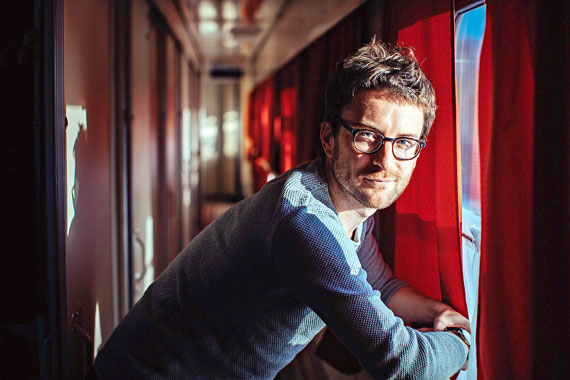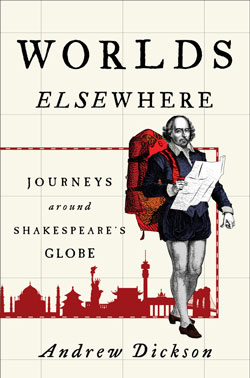Andrew Dickson: with Shakespeare across Russia
As a part of the UK-Russia Year of Language and Literature 2016 the British Council has gathered a party of Russian and British writers, artists, photographers and musicians to travel along the Trans-Siberian railway, experience local culture and share stories through music, poetry and readings. One of them is Andrew Dickson, an acclaimed British journalist, writer and researcher. With a warm smile and exclusively British politeness he agreed to talk about Russia and his book Worlds Elsewhere: Journeys Around Shakespeare’s Globe.

Foto Maxim Avdeev
Andrew, you have travelled halfway along Trans-Siberian railway, Krasnoyarsk is the final stop. Has it met your expectations? How do you feel?
Honestly, I could carry on! In every journey what you expect is always different from what actually happens but that is the point, I guess. I did not know what my expectations were. People of England do not have much sense of Siberia. Even where it is or how big it is. We do not realize how big it is. It’s so enormous. People think of Siberia and they think of snow, ice, bears, wolves... But it was fascinating to find here big and beautiful cities.
This year to coincidence with the 400th anniversary of his death Shakespeare’s life was celebrated by people around the world. In your book you tell about Shakespeare as a global phenomenon. How did you start your research?
Literally it all started years ago. I travelled across London to an old video rental store to find King Lear film by Grigori Kozintsev which was the only VHS copy with old fashioned cover of the Soviet era. I knew the play very well but as I watched it I was stunned by the vast Russian landscape and Kozintsev’s sense of literal and political wilderness. Soon after I thought Why? Why is Shakespeare the most translated author in history? Why did he end up in so many countries, including Russia, China, and South Africa? And what happened to him there?

What was the most unexpected place or context in which you have found Shakespeare?
There were so many. I`ve seen dubstep and Bollywood adaptations. However, the craziest performance I saw was in Munich, Germany. It was King Lear set on a countryside farm. And on stage there were twelve live pigs. There were nets stopping them approaching the audience, and they were spending their time just wandering around. Obviously, German theatre must have had a very high concept.
Is there anything that British would never allow to do to their greatest poet?
Shakespeare is the symbol of British literature, the symbol of Britishness. We regard him very seriously, and it is compulsory in Britain to study Shakespeare’s plays in school. There is conservatism in a way people approach Shakespeare. For example, there is a version of Hamlet with Benedict Cumberbatch in which the director altered the famous speech To be or not to be and put it at the beginning of the play instead of act III, scene I. This controversy was so enormous that it made the front page of The Times, Britain’s most important newspaper! This was such a scandal that one would mess with Hamlet in this way! For me it was funny because earlier I had seen the German Hamlet where To be or not to be appeared three separate times.
Being British, you seem tolerant of such interpretations.
I hope I am! In Britain we are so cautious that we cannot mess with Shakespeare. And it’s sad. I feel that Shakespeare has to be alive and you have to mess with Shakespeare. Not everything you do to Shakespeare will be good, but you cannot just do anything. It has to be reinvented and reinterpreted.
Will you ever write about Shakespeare’s presence in Russian culture?
Oh, Russia is the greatest absence in my book! I felt really bad while giving a lecture in Moscow. Shakespeare’s presence in your country is so deep. None other than Catherine the Great adapted The Merry Wives of Windsor and Timon of Athens being the only serving head of state who moonlighted as a Shakespeare translator. Since the early 18th century Shakespeare was very important for writers like Tolstoy or Pasternak, who translated Shakespeare as a way of continuing to write when Stalin was against him. For Chekhov, of course, who is my favourite Russian author. I always think of Uncle Vanya as another version of Hamlet. Shakespeare in Russia will be volume two.
Let’s imagine that Shakespeare wrote about Russia. Where, in your opinion, would he set his play?
Unlike me Shakespeare seems to have been an unadventurous traveler, to put it mildly: to the best of our knowledge, he spent his entire life in Stratford-upon-Avon, in London or on the road between the two which is 137 km. But his imagination roamed far and wide. He set plays in Austria, Scotland, Denmark, Turkey, Italy and Cyprus. The great thing about Shakespeare that his plays could be set anywhere. You could stage The Tempest on a tropical island with palm trees and monkeys. Or you could set it in taiga near Krasnoyarsk. Shakespeare is so adaptable that his plays, even transformed or translated, could work anywhere.
There is a lot of speculation about the personality of Shakespeare, whether it was a group of people, Francis Bacon or someone from Elizabethan court. What do you believe in after years of research?
It is a pure American conspiracy that Shakespeare was not Shakespeare. None of his colleagues, fellow writers, none in the Elizabethan time doubted that it was him. If you read and understand Shakespeare, there is nothing in his plays that he could not know. I believe there is a lot of snobbery in the idea that the greatest writer of all times has to be a rich man, an aristocrat, a king or a queen. Why should anyone doubt that a man from a small town with a grammar school education just read a lot, met people, observed the world around him and perhaps was a genius of his time? I do believe Shakespeare was Shakespeare. And if anyone looks for the evidence — there is no evidence that he was not.
Интервью подготовила Ольга Чистова, преподаватель кафедры лингвистики и межкультурной коммуникации ИФиЯК